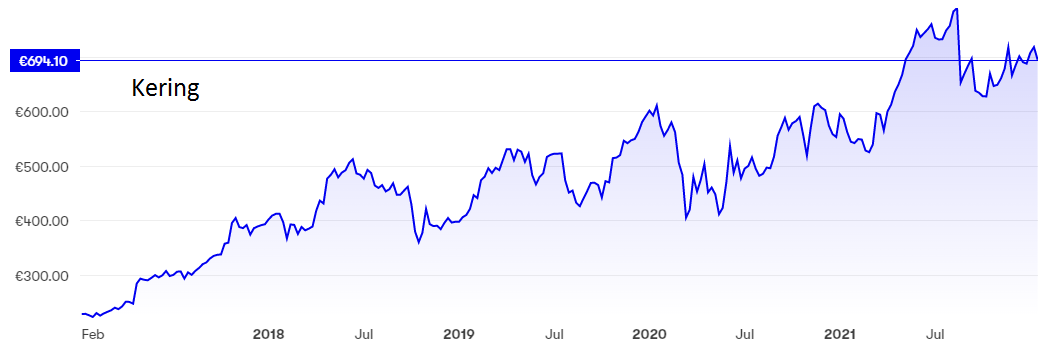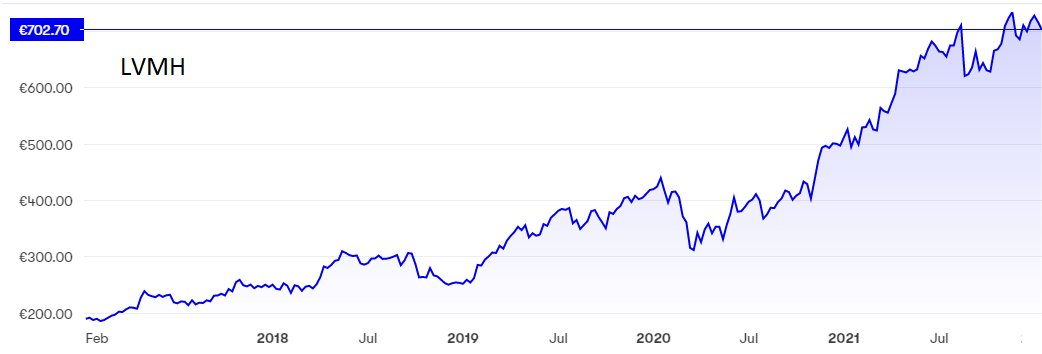Two posh stocks we can all buy
12th January 2022 08:55
by Rodney Hobson from interactive investor
Some sectors are largely unaffected by economic cycles, generating profits for the company and shareholders through thick and thin. Our overseas investing expert likes this pair.

Rodney Hobson is an experienced financial writer and commentator who has held senior editorial positions on publications and websites in the UK and Asia, including Business News Editor on The Times and Editor of Shares magazine. He speaks at investment shows, including the London Investor Show, and on cruise ships. His investment books include Shares Made Simple, the best-selling beginner's guide to the stock market. He is qualified as a representative under the Financial Services Act.
Pandemic restrictions around the world have made investing in retailers much more risky. But then again there are companies such as Kering SA (EURONEXT:KER) and LVMH Moet Hennessy Louis Vuitton SE (EURONEXT:MC) selling luxury goods that are in demand among people with money whatever obstacles life throws up.
Kering is most famous for its flagship brand Gucci, which accounts for 57% of revenue and 80% of profit, and it also owns Yves Saint Laurent, Alexander McQueen and Balenciaga. The whole group performed remarkably well in the first nine months of the year despite the impact of rising cases of Covid-19 on sales in the lucrative Asia Pacific region.
- Invest with ii: Buy International Shares | Super 60 Investment Ideas | Interactive investor Offers
Following a strong first half, revenue showed a 13% rise to €4.2 billion in the third quarter to the end of September, with all parts of the business comfortably ahead of the same three months of 2019 before the pandemic struck.
- European stock market outlook 2022: flexibility remains key
- Europe’s stock market: an introduction to investing on the continent
- Want to buy and sell international shares? It’s easy to do. Here’s how
All parts of the globe put in commendable performances, with strong momentum in North America and improvements in Europe and Japan despite an absence of tourists who form a vital part of the group’s clientele.
Pessimists will worry that sales growth was already slowing in 2019 ahead of the pandemic and that progress has continued to be slower than it was a few years ago. Nonetheless, the overwhelming majority of companies of any description would be ecstatic with that kind of growth.

Source: interactive investor. Past performance is no guide to future performance
Investor sentiment going into 2022 will depend heavily on trading during the key Christmas period. We should know more by the end of this month but there are high hopes for Gucci’s new Aria collection.
I suggested buying Kering at up to €475 in July 2019 after a decline from a peak of €537 three months earlier, with the proviso that cautious investors might like to wait to see if the shares slipped back further. Caution won on that occasion, with the price bottoming out at €426 a few weeks later.
The pandemic halted the subsequent recovery at €600 and all the gains made in the meantime were quickly dissipated, but Kering is now flying high above €700, where the yield has been reduced to only 1.12%. Even so, UBS, Barclays HSBC and DZ Bank have all recently raised their ratings on the stock.
- How my share tips performed in 2021
- Terry Smith on why Fundsmith Equity fell slightly short in 2021
- Richard Hunter: should investors be CIRCUMSPECT in 2022?
- Friends & Family: ii customers can give up to 5 people a free subscription to ii, for just £5 a month extra. Learn more
Like Kering, LVMH boasted double-digit sales growth in the third quarter, actually improving considerably on a strong performance in the first half. Revenue rose a remarkable 20% in the July-September quarter compared with the same period in 2019, and for the first nine months the comparison shows an 11% improvement, with the US and Asia faring particularly well.
LVMH offers a wider range of goods than Kering’s mainly fashion lines, including leather, watches, jewellery, wine and cosmetics as well as owning 5,000 retail outlets around the globe. Fashion and leather are the fastest growing parts of the group, while watches and jewellery are benefiting from the consolidation of Tiffany & Co into the empire plus a new production line for Bvlgari.

Source: interactive investor. Past performance is no guide to future performance
The shares have performed strongly over the past five years, rising from €200 to €700, where the yield is 1%. Fourth-quarter results should soon indicate that this faith is justified.
- Chart of the week: time to take profits on these trades?
- Bull and bear points for major equity markets at start of 2022
- Subscribe to the ii YouTube channel for our latest New Year share tips and fund manager interviews
Hobson’s Choice: Kering’s shares raced ahead of themselves last year but are back to a more reasonable level. Existing shareholders should hold on; prospective buyers may do better to see if the price slips further, as is likely. Below €650 would be a big buying opportunity.
Nor is there any reason for LVMH shareholders to cash in at this stage, although again the shares look fully priced for now. There looks to be a floor around €665, so any chance to buy near that level is worth considering.
Rodney Hobson is a freelance contributor and not a direct employee of interactive investor.
These articles are provided for information purposes only. Occasionally, an opinion about whether to buy or sell a specific investment may be provided by third parties. The content is not intended to be a personal recommendation to buy or sell any financial instrument or product, or to adopt any investment strategy as it is not provided based on an assessment of your investing knowledge and experience, your financial situation or your investment objectives. The value of your investments, and the income derived from them, may go down as well as up. You may not get back all the money that you invest. The investments referred to in this article may not be suitable for all investors, and if in doubt, an investor should seek advice from a qualified investment adviser.
Full performance can be found on the company or index summary page on the interactive investor website. Simply click on the company's or index name highlighted in the article.
Disclosure
We use a combination of fundamental and technical analysis in forming our view as to the valuation and prospects of an investment. Where relevant we have set out those particular matters we think are important in the above article, but further detail can be found here.
Please note that our article on this investment should not be considered to be a regular publication.
Details of all recommendations issued by ii during the previous 12-month period can be found here.
ii adheres to a strict code of conduct. Contributors may hold shares or have other interests in companies included in these portfolios, which could create a conflict of interests. Contributors intending to write about any financial instruments in which they have an interest are required to disclose such interest to ii and in the article itself. ii will at all times consider whether such interest impairs the objectivity of the recommendation.
In addition, individuals involved in the production of investment articles are subject to a personal account dealing restriction, which prevents them from placing a transaction in the specified instrument(s) for a period before and for five working days after such publication. This is to avoid personal interests conflicting with the interests of the recipients of those investment articles.